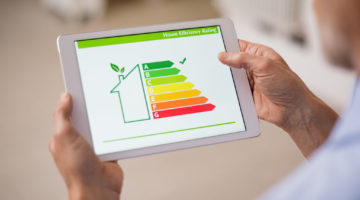
When selling a house, it’s only natural that you want to get the best possible price you can for it. There are many ways to do that, so what should be top of your list?
With so much paperwork to go through, the Energy Performance Certificate might be one that’s never occurred to you before, or you’re not yet familiar with. So how much of an effect does the EPC really have?
What is an EPC?
Energy Performance Certificates were first introduced by the government in 2007, to present accurate representations of how energy efficient different properties are. This is especially important in the UK, where the housing stock can be hundreds of years old, and energy efficiency varies so massively. The certificates are divided into domestic and non-domestic types, but both are essentially the same basic thing.
An EPC is required by UK law every time a property is sold or rented. There are some exceptions to this with listed or condemned buildings, but even with these types of properties, most solicitors will still require the EPC paperwork.
An EPC gives the property a number of points between 0-100, which equates to a rating between an A (highest) and a G (lowest). In 2018 the Minimum Energy Efficiency Standards (MEES) were brought in to prevent any properties rated lower than an E being rented out, however it is important to note that the MEES have no impact on properties being bought and sold.
What does an EPC survey involve?
If you’re in a hurry to get your house sold fast, you might be concerned that acquiring an EPC is a lengthy process, but in most cases it’s not. If you have a standard domestic property with less than 6 bedrooms, the initial EPC visit should take no longer than 45 mins. A lot of places will offer 24-hour turnaround on their EPC paperwork, meaning you could get the appropriate energy performance certificate officially lodged within a day.
The visit itself involves gathering information about various aspects of the property. This includes the boiler, the insulation, the windows, the central heating system, any hot water tanks. The assessor will make a rudimentary floorplan and take pictures as they work, in order to provide the evidence necessary to lodge the certificate.
EPC surveys are non-invasive. That means that if you have loft insulation, for example, the surveyor must be able to easily get up there to see in order to lodge it. They cannot take your word for it, and they can’t make boreholes to check for cavity wall insulation or cause any damage. If you have any work that you think should be included on the EPC that the assessor will not be able to easily see or access, paperwork like invoices or warranties can be used to prove the existence of it and get it included on the survey.
Will the EPC rating affect my house price?
A good EPC can certainly improve how attractive your home is to potential buyers. This is because energy efficiency means lower bills.
Studies by both the UK government Department of Energy & Climate Change, and an independent study by MyMoneySupermarket have shown how much an EPC can improve the value of a home. In fact, the average English home could increase in value by up to 14%, if improved from a G rating to D.
The extent to which your EPC will affect your house price is determined by where the rating sits on the scale, and where you are in the country. For example, in London improving your EPC has much less effect than in the North East. This is linked to lifestyle differences and property prices, which vary between different areas.
When you get an EPC completed on your property, recommendations for how to improve it are included on the certificate itself. This is coupled with the approximate cost of making the improvement and the estimated number points it would improve your EPC by. If you’re looking for a quick sale at the best price, it might be worth discussing with your estate agent whether they think the recommended upgrades are worth considering.












Had an EPC inspection carried out absolutely useless, recommendation by the assessor was to fit solar panels, we have had 15 panels on our roof since 2015 how did the assessor manage to not see them? Complained and still waiting for an updated certificate.
Its obvious that you do not appreciate energy efficiency and savings. We are damaging our planet. We dont have a planet B to migrate to. We NEED to live sustainably. What ideas have you got? I suggest instead of complaining use you energy in positive way. 🙂
EPC are a complete SCAM. I had a (D) rating property to let. To upgrade to a (B) I had to undertake work costing me thousands and thousands of pounds with little returns. Take for example it stated for recommendations for Interna and external wall insulation typical insulation cost: £4000-£14000 would result in a typical yearly saving £111. So take the minimal spend of £4000 divide that by £111 and you end up recovering your cost after 36 YEARS!!!!!!. THIS IS ONE ALMIGHTY BS SCAM I’ve EVER come across. Do they think we are STUPID IDIOTS. We must collectively write to them to abolish this abominable hair brain scheme and come up with something that actually brings all round benefits to those concerned NOT only to tenants, tradespeople and above all the government who take a CUT from this corrupt SCHEME. WHY SHOULD LANDLORD continue to accept this SHITE!!!!!
As a fellow landlord and energy assessor you should know that to rent your property the epc needs only be an E rating. Yours is a D rating so why the bleating!…..A recommendation is just that a recommendation not an enforcement notice…..get a grip lad!….and you can now get up to £5000 on the green homes grant for improvements!….its not all bad!!